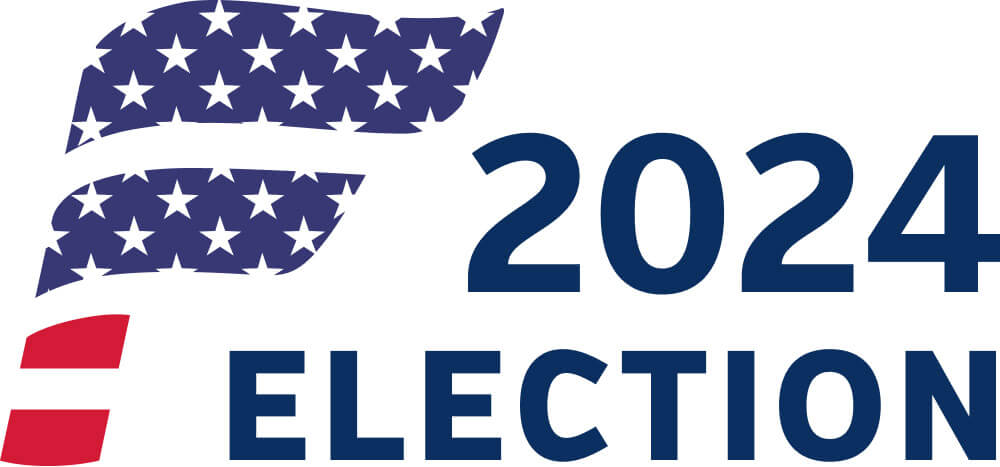Millions of dollars, hundreds of volunteers: How groups are mobilizing Jewish voters in swing states
‘I do not want Democratic leaders to keep Jewish voters for granted,’ said one official

Jewish voter outreach merch and posters by the Republican Jewish Coalition and the Jewish Democratic Council of America. Graphic by Jacob Kornbluh/Photo on the right by Ronda Churchill/Bloomberg via Getty Images
With just 55 days until the presidential election and early voting set to begin in Pennsylvania later this month, Jewish groups are ramping up their get-out-the-vote efforts in the tightly contested swing states where Jewish voters could play a crucial role.
 The Republican Jewish Coalition and the Jewish Democratic Council of America, the official Jewish arms of both parties, have deployed dozens of paid staff and hundreds of volunteers to engage in grassroots efforts like phone banking, door-knocking, canvassing and writing letters to the editor.
The Republican Jewish Coalition and the Jewish Democratic Council of America, the official Jewish arms of both parties, have deployed dozens of paid staff and hundreds of volunteers to engage in grassroots efforts like phone banking, door-knocking, canvassing and writing letters to the editor.
Sam Markstein, a spokesperson for the RJC, said that in recent months, the organization has primarily relied on volunteers in key swing states such as Arizona, Georgia, Michigan, Nevada, and Pennsylvania, armed with sophisticated data modeling to engage persuadable voters in support of former President Donald Trump. These efforts are supplemented by a $15 million budget for TV and digital advertising. “This is the most comprehensive and aggressive effort from any Jewish group to turn out Jewish voters for their candidate,” Markstein said.
The JDCA has launched a similar ground operation in support of Vice President Kamala Harris, though with a more modest budget. Halie Soifer, JDCA’s chief executive, said the group plans to spend more than $2 million on Jewish voter outreach, with more than half earmarked for digital ads on social media and “connected TV platforms” in seven key swing states, including North Carolina and Wisconsin. Soifer said that the paid political organizers, including 46 campus fellows, have already made more than one million direct voter contacts, working six days a week, except for Saturdays. “Our goal this cycle was to make two million direct voter contacts, and we are on track to far exceed that,” she said.
The majority of the effort is concentrated in Pennsylvania, due to its sizable Jewish population and history as a swing state. Jews make up an estimated 3% of the Pennsylvania electorate. In the 2020 election, Biden won the state by only one percentage point. A Fox News exit poll showed that 72% of Jewish voters backed Biden, while 26% supported Trump.
A non-partisan group affiliated with the Orthodox Union’s Teach Coalition, which played a key role in mobilizing Jewish voters in Westchester County to help defeat Rep. Jamaal Bowman in the June Democratic primary, is opening an office in Philadelphia next week to replicate that effort on the presidential level. The new office will serve as a hub for volunteers working to increase voter turnout, said Maury Litwack, the group’s chief executive.
On Sunday morning, Manhattan Borough President Mark Levine, who is Jewish, gathered hundreds of supporters on the Upper West Side of Manhattan, encouraging them to sign up for bus trips and phone banking to reach voters in Pennsylvania. With New York being a solidly blue state, the focus is on boosting voter engagement in the battleground state next door, Levine said in an interview.
“The energy’s there,” Levine said. “We want people to know that they have a role to play in a close election where the stakes are high. And we’re giving them tangible ways to do that.” He launched a website called “Let’s Go Dems,” a recreation of the “Wake Up Dems” campaign from 2022 that helped secure Gov. Kathy Hochul’s victory over her GOP opponent, former Rep. Lee Zeldin, who garnered significant Jewish support and came close to winning.
Why the Jewish vote matters

Recent polls show a tight race between Harris and Trump in the five states Biden won in 2020 by less than 3% — Arizona, Georgia, Michigan, Nevada and Pennsylvania — and where Jewish voters make up an estimated 1% to 3% of the electorate. A new poll of Jewish Americans, sponsored by the JDCA, had Harris with a 68% to 25% lead over Trump. It also showed that only 9% picked Israel as one of the two most important issues to them. But even a small slip of voters toward Trump could potentially influence outcomes in a crucial battleground state like Pennsylvania.
Levine, an outspoken advocate for Jewish causes and a staunch supporter of Israel, said the Jewish vote is “extremely important” in this election and that Democrats have to do more to earn that vote. “I do not want Democratic leaders to keep Jewish voters for granted,” he said, adding that it’s not good enough to only drive an anti-Trump message, amid deep concerns — even among liberal Jews — about rising antisemitism.
“People feel that Democratic leaders need to speak up more about that,” Levine said. He added that Trump, who denigrated Jews who don’t vote for him and claimed — without citing evidence — that Harris “hates” Israel, is “a bad messenger for his own cause, and I don’t have to do a lot of work to remind voters of that.”
The RJC, aiming to grow Trump’s share of the Jewish vote, are tapping into the emotional attachment to Israel and unease among voters over antisemitism on campus. In a $10 million ad blitz, launched on Tuesday, the RJC portrayed Harris as more in step with the far left than with President Joe Biden on Israel.
The RJC’s Markstein said the ad “crystallizes the key thrust of the messaging” for persuadable voters. “This is a problem that is really personal and really visceral,” he said. “And so when we highlight that Kamala Harris aligns with the Squad on these different topics, it certainly moves them.”
JDCA’s Soifer said her group has also tailored their talking points to reach independent and Republican voters who are still undecided.

















